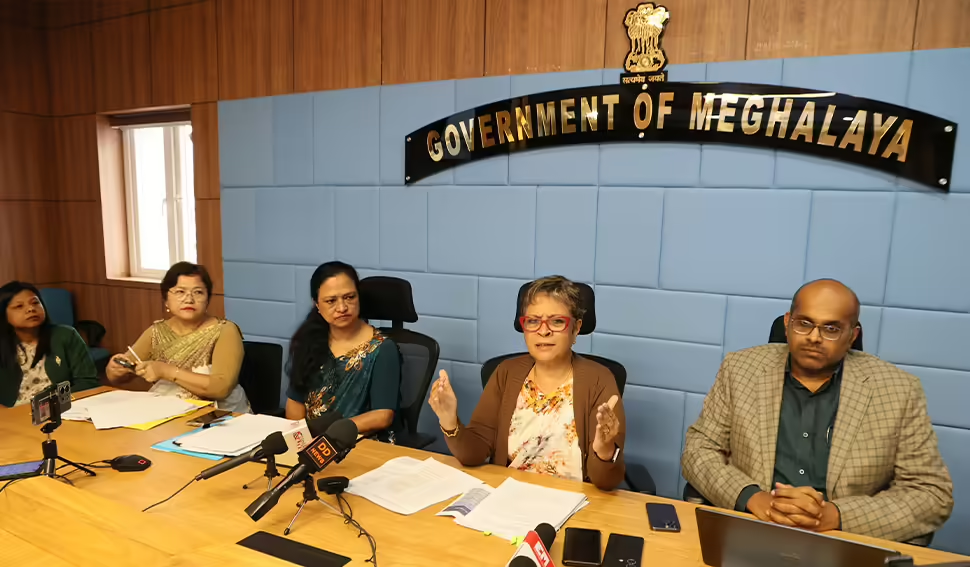Meghalaya records 27 rabies deaths in last 2 years, Govt to come up with action plan: Ampareen
Over 27 people died from rabies in Meghalaya during the past two years even as the state government has decided to come up with an action plan to address the issue and to ensure anti-rabies vaccination are made available upto the primary health care (PHC) level.
“27 deaths (from last year) upto September 2024 is a number which is very alarming. Awareness on rabies has become a big priority and hence before the situation deteriorates, we are already planning an approach and this approach is what we hope will happen henceforth,” Health Minister Ampareen Lyngdoh told reporters at a news conference held here on Thursday.
She informed that tomorrow (Friday), there is a culmination of the week long anti-rabies programme where the animal husbandry & veterinary minister and the health minister will be together at the same platform to receive information on the proposed plans to curb this rampant spread of rabies in the state.
Stating that the issue is very tricky, Lyngdoh said, “There are also protectors of stray dogs. Until all concerned stakeholders come under the same platform, it is going to be next to impossible to handle this. We hope that after this rabies awareness week, we will be able to strategically attend to this big problem and it is also not true that we are waiting for deaths to increase.”
Reminding that anti-rabies vaccination is a responsibility of a citizen, the minister however said, “There is also a talk that rabies vaccination are unable but hence now we are committing to the state that we will ensure that upto the PHC level, there should be rabies vaccination available so that citizens can avail this facility to prevent that. We are hoping that this will happen soon and we hope that we will be able to address it.”
Earlier, State Surveillance Officer of Integrated Disease Surveillance Programme (IDSP) and Nodal Officer for Rabies Dr Valarie Laloo said of 27 cases of rabies death, 11 were reported last year and 16 till September, this year.
The districts with the highest number of rabies deaths were West Khasi Hills and West Jaintia Hills. Both districts have reported 6 cases of rabies deaths each.
According to her, 96 per cent of the rabies deaths were due to dog bites.
The 16th case was related to the recent death of a mid level health provider (MLHP) after getting bitten by a stray dog two months ago.
“This incident was also very unfortunate because being a health professional herself, MLHP, she succumbed to this disease, which is actually 100% preventable and at the same time 100% fatal.
With vaccination and wound management at the right time, this disease could be prevented but unfortunately because of reasons unknown to us, MLHP could not get the vaccine at the right time and as I mentioned rabies is a fatal disease and once the signs and symptoms started to be shown in her, there was no chance of getting back to normal, it is progression towards fatality” Dr Laloo said.
Asked, Dr Laloo said the rabies deaths were probably due to lack of awareness and at the same time complacency.
“Usually we think that puppies are still sterile, they don’t have much diseases in them, we find them cute and harmful but actually puppies less than 2 months old are not vaccinated. So these are the stages where if there is any infection in them, they are most probably infect another,” she said.
She further informed that rabies is a notifiable disease since March 23 last year. Before that, there was no system of reporting and documenting cases.
“Actually we have 17 cases but the 17th case we have not completed our investigation yet. So officially there are 16 cases of rabies deaths till September this year,” she added.
“Most of the cases were stray dogs, only one or two were there own pets and majority of them were in rural areas and also the majority of them did not receive any vaccination after the bite,” the doctor said.
Dr Laloo also informed that the health department is having good coordination with the Shillong Municipal Board and also Animal Husbandry & Veterinary department. The Municipality has dog catchers, who have been catching stray dogs and the veterinary department has been conducting these mass vaccination campaigns all across the state.
As per report, around 600 stray dogs have been vaccinated so far in East Khasi Hills alone, she added.


Leave a Reply